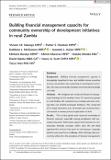| dc.contributor.author | Sakanga, Viviane I.R. | |
| dc.contributor.author | Chastain, Parker S. | |
| dc.contributor.author | McGlasson, Kathleen L. | |
| dc.contributor.author | Kaiser, Jeanette L. | |
| dc.contributor.author | Bwalya, Misheck | |
| dc.contributor.author | Mwansa, Melvin | |
| dc.contributor.author | Mataka, Kaluba | |
| dc.contributor.author | Kalaba, David | |
| dc.contributor.author | Scott, Nancy A. | |
| dc.contributor.author | Vian, Taryn | |
| dc.date.accessioned | 2022-04-11T22:10:00Z | |
| dc.date.available | 2022-04-11T22:10:00Z | |
| dc.date.issued | 2019-04-26 | |
| dc.identifier.citation | Sakanga VIR, Chastain PS, McGlasson KL, Kaiser JL, Bwalya M, Mwansa M, Mataka K, Kalaba D, Scott NA, Vian T. Building financial management capacity for community ownership of development initiatives in rural Zambia. Int J Health Plann Manage. 2020 Jan;35(1):36-51. doi: 10.1002/hpm.2810. Epub 2019 May 23. PMID: 31120153; PMCID: PMC7043374. | en_US |
| dc.identifier.other | DOI: 10.1002/hpm.2810 | |
| dc.identifier.other | PMID: 31120153 | |
| dc.identifier.other | PMCID: PMC7043374 | |
| dc.identifier.uri | https://repository.amref.ac.ke/handle/123456789/658 | |
| dc.description | This is an open access article under the terms of the Creative Commons Attribution License, which permits use, distribution and
reproduction in any medium, provided the original work is properly cited.
© 2019 The Authors The International Journal of Health Planning and Management Published by John Wiley & Sons Ltd | en_US |
| dc.description.abstract | Background: Building financial management capacity is increasingly important in low- and middle-income countries to help communities take ownership of development activities. Yet, many community members lack financial knowledge and skills.
Methods: We designed and conducted financial management trainings for 83 members from 10 community groups in rural Zambia. We conducted pre-training and post-training tests and elicited participant feedback. We conducted 28 in-depth interviews over 18 months and reviewed financial records to assess practical application of skills.
Results: The training significantly improved knowledge of financial concepts, especially among participants with secondary education. Participants appreciated exercises to contextualize financial concepts within daily life and liked opportunities to learn from peers in small groups. Language barriers were a particular challenge. After trainings, sites successfully adhered to the principles of financial management, discussing the benefits they experienced from practicing accountability, transparency, and accurate recordkeeping.
Conclusion: Financial management trainings need to be tailored to the background and education level of participants. Trainings should relate financial concepts to more tangible applications and provide time for active learning. On-site mentorship should be considered for a considerable time. This training approach could be used in similar settings to improve community oversight of resources intended to strengthen developmental initiatives. | en_US |
| dc.description.sponsorship | Deophine Bwalya who assisted in developing the financial management systems, Denson Changwe, Meghan
Polich, and Thandiwe Ngoma for their assistance during the trainings, and Rachel Fong who managed the electronic
data capture and qualitative data systems | en_US |
| dc.language.iso | en | en_US |
| dc.publisher | wileyonlinelibrary | en_US |
| dc.subject | Capacity building | en_US |
| dc.subject | Community ownership | en_US |
| dc.subject | Financial management | en_US |
| dc.subject | Sustainability | en_US |
| dc.subject | Training. | en_US |
| dc.title | Building Financial Management Capacity for Community Ownership of Development Initiatives in Rural Zambia | en_US |
| dc.type | Article, Journal | en_US |

